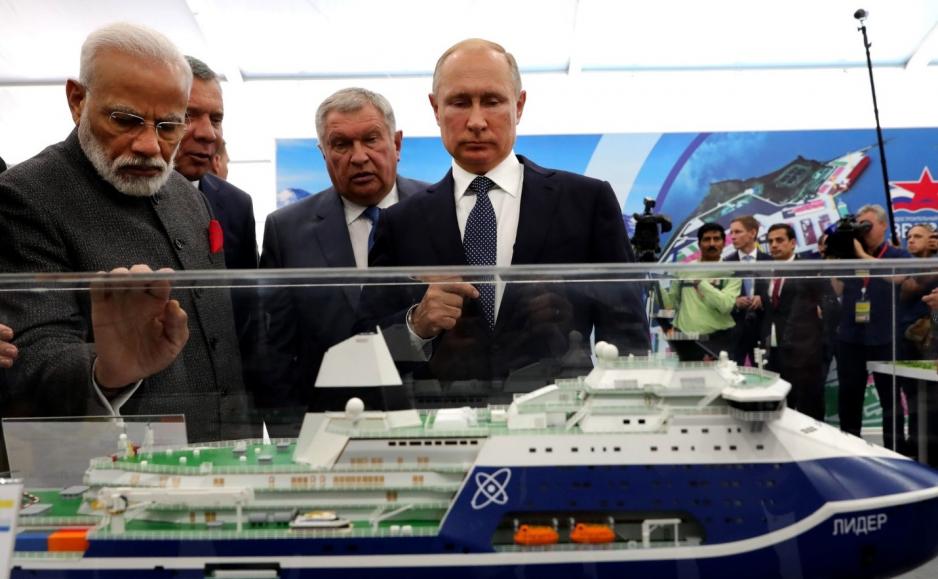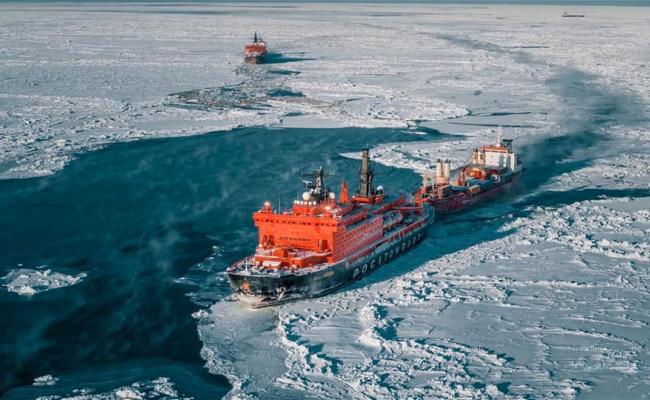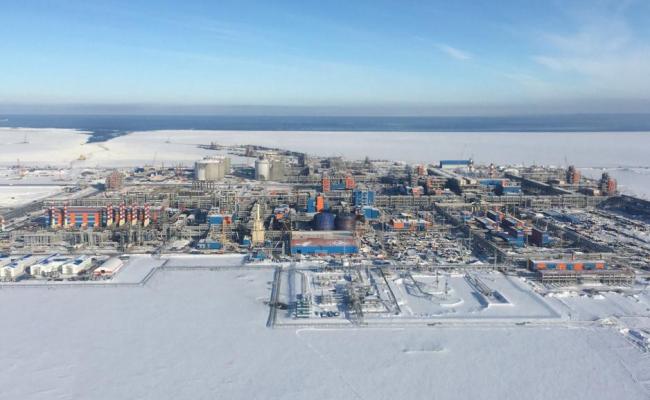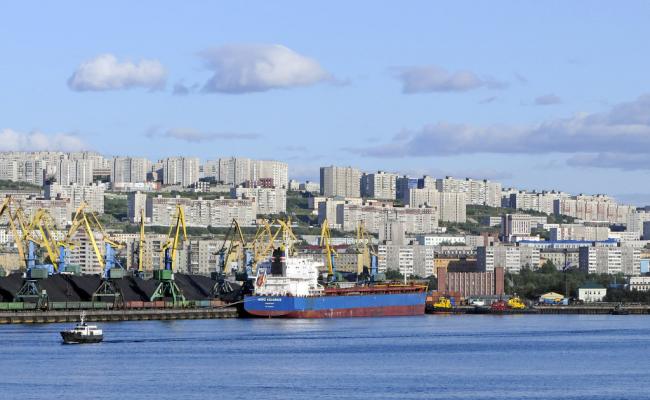India has Entered the High North to Ascertain Global Reach, Says Expert on Polar Geopolitics

Russian President Vladimir Putin, Indian Prime Minister Narendra Modi, and Rosneft CEO and Chairman Igor Sechin at the Zvezda Shipyard in Bolshoi Kamen, Russia. (Press Release: President of Russia, Kremlin).
India has recently taken an increased interest in the Arctic and is cooperating more and more with Russia. "Far from the Arctic geographically, India has inserted itself into the High North to ascertain global reach and international standing", says Dr. Elizabeth Buchanan.
Earlier this year, the non-Arctic state of India released a new Arctic Policy. According to the policy, India seeks to play a constructive role in the Arctic by leveraging its scientific pool and expertise in Himalayan and Polar research. The country would also like to contribute to ensuring that as the Arctic becomes more accessible, the harnessing of its resources is done sustainably and in consonance with best practices formulated by bodies such as the Arctic Council.
India and Russia are strengthening their cooperation on energy and defense. Last week, the two countries announced, during a visit by President Vladimir Putin to New Delhi, that they are expanding defense ties, including the details of a $5.4 billion missile defense system sale to India. The countries are also cooperating on transporting Russian crude oil and strengthening LNG imports to India, using the Northern Sea Route for energy supply. They furthermore explore opportunities for joint development of hydrocarbons in the Arctic and Russian parts of Asia.
Dr. Elizabeth Buchanan is an expert on polar geopolitics and lecturer in Strategic Studies at Deakin University Australia and a Fellow of the Modern War Institute at West Point. She says strategic climate research is a key interest for India in the Arctic.
Energy, security, and strategic climate research
What does India want to achieve in the Arctic?
"Interests include energy, security, strategic climate research, and nationalism when it comes to India and the Arctic. Energy-wise, Delhi is looking to secure supplies from Russia's Arctic LNG ventures and, in the longer term, work with Moscow not on the Northern Sea Route but on the International North-South Transport Corridor (INSTC), a land corridor that will connect Russian Arctic hydrocarbons to India. This is of interest to Russia as well, given the ability to diversify export corridors, and certainly; diversify its customer base in Asia away from China", she says and continues:
"Strategic climate research is a key interest for India, and it has been the basis of Delhi's Arctic presence at its Arctic stations - Himadri & IndArc - on the Svalbard archipelago. The Arctic is a bellwether for climate change and environmental data collection, which is critical to Indian security, given the uptick in climate-induced extreme weather events (disastrous monsoon seasons, flash flooding & crop yield implications)", says Buchanan, and adds:
"Nationalism is an interesting basis for India's Arctic goals, indeed the fact that India crafted an Arctic Strategy points to this reality. Far from the Arctic geographically, India has inserted itself into the High North for the aforementioned reasons, but also quite simple to ascertain global reach and international standing. On the back of India's well-established, over 30 years now, Antarctic program, it has established 3 stations on the continent, two of which are operational today."
Nationalism is an interesting basis for India's Arctic goals, indeed the fact that India crafted an Arctic Strategy points to this reality
Pivotal partner for Russia and the U.S
What do you think about the Indian Arctic Policy?
"India will emerge as a useful 'pivot partner' in the Arctic for both Russia and the U.S. It has the potential to offset enhanced Chinese interest in the Arctic. The U.S might look to join with India to balance against a perceived Sino-Russian alignment in the Arctic, however, Moscow might also look to India to reduce its own economic reliance on Beijing in the Arctic with regards to the development of the NSR & energy ventures", says Buchanan and adds:
"I think India's Arctic interests are more about the transportation and trade aspects of the region - India is looking past the pinnacle of China to a point 25+ years when India itself has not only overtaken China in terms of economic power, but also the demographic and diplomatic variants of national power. The linking of the INSTC to Russia's Arctic region is a clear strategic priority, as is grasping the impact of a shifting maritime corridor which sees global trade divert from the Suez Canal to the NSR for East-West shipping".
Russia has too much economically at stake in the Russian Arctic zone to threaten with unnecessary militarization from beyond the region
Broadening of defense ties
India and Russia recently broadened their defense ties. Could this affect the militarization of the Arctic in any way?
"As with Moscow's playbook with regards to China in the Arctic, Russia partners with no other when it comes to defense and security in the region. We should not expect Sino-Russian Arctic exercises, nor Indian-Russian exercises in the region. What we can and should expect to see, are pockets of training collaboration used to bolster bilateral ties at the international level. China is training in the third pole, the Himalayas. This is important in terms of its enhanced cold weather and extreme cold military capability", she says, and continues:
"India has defense interests, of course, in the third pole, too. But India and China training in a similar environment to the Arctic does not really translate into an expectation for Indian, nor Chinese, military ambitions in the Arctic. Arctic rim states themselves do not want to fight a war in the Arctic! Russia's Indian strategy, with regards to defense ties, is quite pragmatic and follows along the same lines as its Chinese and even Pakistani policies - arm, engage but never trust", Dr. Buchanan, says and adds:
"Russia has too much economically at stake in the Russian Arctic zone to threaten with unnecessary militarization from beyond the region. And at the rate with which Russia is going in, developing joint partnerships and special strategic relationships with other states, this simply diversifies the stakeholders globally with an interest in keeping the Arctic a zone of 'low tension'", says Buchanan in closing.






